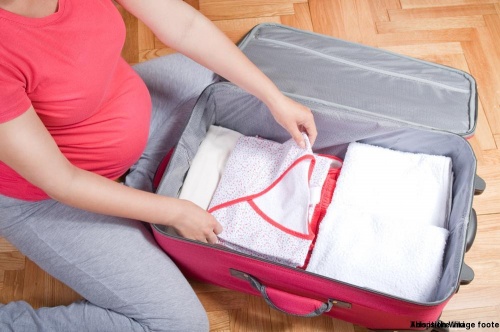Difference between revisions of "Getting Ready for the Birth"
| (2 intermediate revisions by the same user not shown) | |||
| Line 1: | Line 1: | ||
| + | '''When to Go to the Hospital:''' | ||
| + | |||
| + | Many women experience false labor, which feels a lot like labor but doesn’t mean that the child is coming. To know when it’s true labor, watch for contractions coming every five to 15 minutes, lasting over one minute long, and having this process last over an hour. And it shouldn’t die down if you get up or move around. If this happens, get all your last-minute preparations completed and call someone (spouse, coach, family member, etc.) to take you to the hospital. Most women have more than enough time to get to the hospital before they really need to be there. For women with their first child the first stage of labor usually lasts at least eight hours (and up to 12 - 14 hours), seven hours for those who’ve had children before. | ||
| + | |||
'''What to Do When You Go into Labor''' | '''What to Do When You Go into Labor''' | ||
| Line 4: | Line 8: | ||
*Get any last-minute things for your overnight bag. | *Get any last-minute things for your overnight bag. | ||
*Get health insurance card, ID, and any needed medical [[records]]. | *Get health insurance card, ID, and any needed medical [[records]]. | ||
| − | + | [[File:What-to-Do-When-You-Go-into-Labor.jpg|thumb|500px]] | |
'''What to Bring:''' | '''What to Bring:''' | ||
| Line 37: | Line 41: | ||
*Hard candies or lollipops | *Hard candies or lollipops | ||
*Something to massage back during labor (tennis ball, rolling pin, etc.) | *Something to massage back during labor (tennis ball, rolling pin, etc.) | ||
| − | *Books for distraction | + | *[[Books]] for distraction |
| − | + | ||
| − | + | ||
| − | + | ||
| − | + | ||
| − | + | ||
| − | Return to [[Pregnancy Labor and Delivery]] or [[ | + | Return to [[Pregnancy Labor and Delivery]] or [[Pregnancy]] |
[[Category: Pregnancy Index]] | [[Category: Pregnancy Index]] | ||
==Resources== | ==Resources== | ||
| − | The American College of Obstetricians and Gynecologists. “Your [[Pregnancy]] and Birth.” Meredith Books. 2005. | + | The American College of Obstetricians and Gynecologists. “Your [[Pregnancy]] and Birth.” Meredith [[Books]]. 2005. |
Latest revision as of 10:31, 23 January 2015
When to Go to the Hospital:
Many women experience false labor, which feels a lot like labor but doesn’t mean that the child is coming. To know when it’s true labor, watch for contractions coming every five to 15 minutes, lasting over one minute long, and having this process last over an hour. And it shouldn’t die down if you get up or move around. If this happens, get all your last-minute preparations completed and call someone (spouse, coach, family member, etc.) to take you to the hospital. Most women have more than enough time to get to the hospital before they really need to be there. For women with their first child the first stage of labor usually lasts at least eight hours (and up to 12 - 14 hours), seven hours for those who’ve had children before.
What to Do When You Go into Labor
- Call midwife, partner or birth coach, and someone to care for other children, if necessary.
- Get any last-minute things for your overnight bag.
- Get health insurance card, ID, and any needed medical records.
What to Bring:
For Mom:
- Maternity bras
- Underpants
- Nightgown that opens in the front or comfortable pajamas
- Breast pads
- Super-adsorbent sanitary pads
- Warm socks
- Toiletries (makeup, soap, toothbrush, toothpaste, brush)
- Glasses or contact lenses (if needed)
- Insurance information
- Loose-fitting clothes for coming home in
For Baby:
- Newborn diapers
- Infant car seat
- Several pairs of footed pajamas
- A soft hat
- Couple of baby nighties
- One or two receiving blankets
Optional:
- Towel and washcloth
- Slippers
- Bathrobe
- Camera
- CD player, MP3 player, and soothing music
- Cell phone
- Snacks for you and your partner or coach
- Hard candies or lollipops
- Something to massage back during labor (tennis ball, rolling pin, etc.)
- Books for distraction
Return to Pregnancy Labor and Delivery or Pregnancy
Resources
The American College of Obstetricians and Gynecologists. “Your Pregnancy and Birth.” Meredith Books. 2005.
